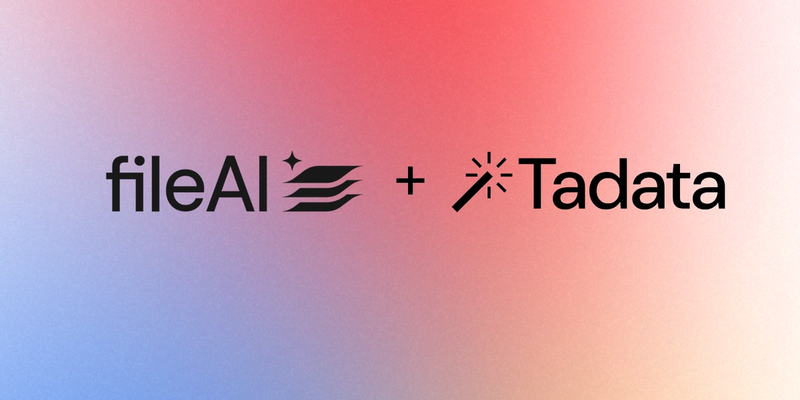
 Tori Seidenstein•August 20, 2025
Tori Seidenstein•August 20, 2025fileAI Case Study: Building an MCP Server to Power Agentic File Workflows
fileAI, trusted by global companies like Toshiba, MSIG, UOB, and KFC, built its reputation on industry-leading document processing. In partnership with Tadata, they developed an MCP server that brings agentic file management to life — enabling AI agents to find, interpret, and act on files automatically. From extracting critical information to routing documents to the right place, this capability transforms workflows that once took hours of manual effort into processes that run on their own, adapting instantly to new data and changing business needs.
The Agentic Opportunity
For over four years, fileAI has delivered document processing solutions to multinational enterprises across document-heavy sectors such as insurance, finance, accounting, and supply chain. Their proprietary Beethoven OCR models automated the parsing, extracting, classifying and verifying of unstructured data, eliminating data preparation for downstream workflows.
With the AI landscape rapidly unfolding, fileAI saw growing demand for agentic file systems – AI-powered agents capable of executing multi-step workflows autonomously. Examples include:
- eKYC systems that validate and process identity documents end-to-end
- Automated discrepancy reporting for compliance and audit readiness
- Real-time data validation in financial transactions
fileAI’s strategic bet is to become the go-to file analytics and automation layer for the new agentic capabilities of longstanding companies, as well as for the entire new generation of AI-native companies.
Why MCP?
From the perspective of Tim Pruger, Head of Engineer and Product at fileAI, MCP was a natural step:
Developers building AI systems want to create agents, workflows, and apps that can push, pull, and write information to all kinds of services. Enterprises want the same, but within their complex processes. MCP bridges both worlds.
By exposing fileAI’s core capabilities through an MCP server, developers could plug fileAI into any MCP-compatible agent — from experimental AI apps to enterprise-scale workflows.
Partnering with Tadata
fileAI already had a robust API, but building a production-grade MCP server from scratch would require significant engineering resources. They turned to Tadata’s MCP-as-a-Service for three key reasons:
- Speed to Market – Tadata allowed fileAI to spin up the first server in minutes, complete with authentication, so the team could test and iterate immediately.
- Protocol Compatibility – Tadata’s middleware ensured the MCP server would work seamlessly across different MCP clients, each with its own protocol quirks.
- Performance Insights – Built-in analytics let fileAI monitor server usage, identify bottlenecks, and optimize the “AI experience” for users.
Dual Impact: External & Internal
The MCP server delivered value in two distinct ways:
- External Agentic Development – Developers, from startups to large enterprises, can now integrate fileAI’s document AI directly into their AI agents and workflows.
- Internal Sales Enablement – fileAI’s sales team can create tailored, interactive demos for prospects entirely through chat, eliminating the time-consuming process of manually crafting custom demos.
Looking Ahead
fileAI is now poised to bring its document processing expertise into the heart of the agentic AI ecosystem.
Try it yourself at file.ai